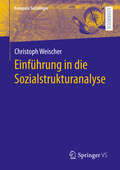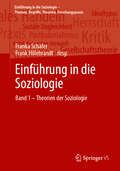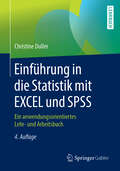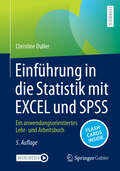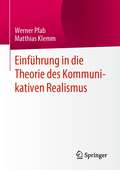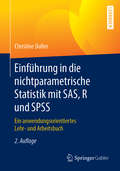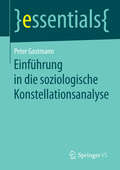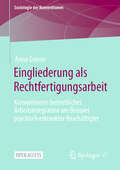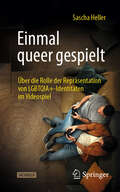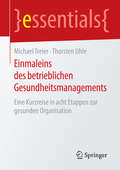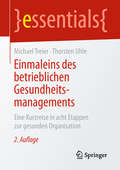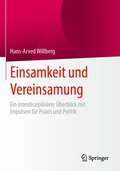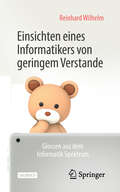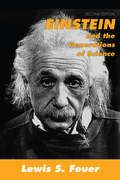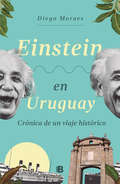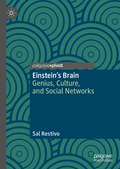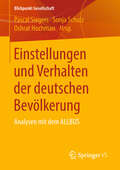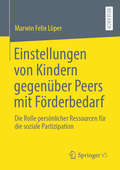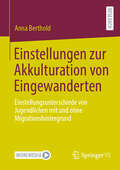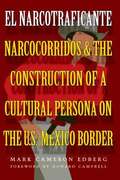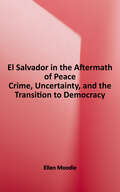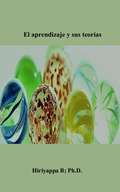- Table View
- List View
Einführung in die Regenerative Energiewirtschaft (RaumFragen: Stadt – Region – Landschaft)
by Sandra HookDie vorliegende Einführung räumt mit angeblichen Technikproblemen, Strompreismythen und Netzinkompatibilitäten auf. Es wird unter anderem aufgezeigt, dass nicht die technische Seite das Problem beim Umstieg auf eine regenerative Energieversorgung darstellt, sondern vielmehr tradierte wirtschaftliche Interessen und die daraus resultierende politische und öffentliche Diskussion, dieser Entwicklung entgegensteht. Eine Entwicklung, die durch ihre Umweltauswirkungen so wichtig geworden ist – da sie nichts Geringeres als die globale Mitteltemperatur maßgeblich beeinflusst – und somit Kern jeder Klimawandeldiskussion. Leitkapitel sind die klassischen Felder der Energiewirtschaft: Beschaffung, Umwandlung und Verteilung. Der Fokus liegt auf der deutschen Energieversorgung und hier im emissionsreichsten Part, der Stromproduktion. Die konventionellen Erzeugungsmethoden werden den regenerativen gegenüber gestellt und zu einem schlüssigen sowie bestechend einfachen System, bei niedrigen volkswirtschaftlichen Gesamtkosten, zusammengeführt.Der InhaltEinleitung und Begriffe • Beschaffung von Energie • Umwandlung von Energie • Verteilung von Energie • Klimaschutzpolitik Die AutorinDr. Sandra Hook ist (Bio-)Geografin und beim Umweltschutzamt in Freiburg tätig. Sie hat mehrere Lehraufträge inne, unter anderem an der Frankfurt University of Applied Sciences.
Einführung in die Sozialstrukturanalyse (Kompass Soziologie)
by Christoph WeischerSoziale Ungleichheiten sind ein brisantes Thema. Wissenschaftliche Sozialstrukturanalysen zielen darauf, Erklärungen für die Entstehung und Reproduktion sozialer Ungleichheiten zu geben. In dieser Einführung werden zentrale Konzepte der Analyse sozialer Ungleichheiten, wichtige Forschungsrichtungen und die damit verbundenen theoretischen Perspektiven erläutert. So geht es um sozioökonomische und soziokulturelle Ansätze, aber auch um die systematische Einbeziehung einer intersektionalen und transnationalen Perspektive. Die einzelnen Ansätze werden immer auch in ihren sozialgeschichtlichen Kontext gestellt. Sie werden als „Modelle&“ mit je unterschiedlichen Erkenntnispotentialen begriffen – so wird das über einen langen Zeitraum kumulierte sozialwissenschaftliche Wissen zum Verständnis von Sozialstrukturen für heutige Studierende zugänglich. Mit der Skizzierung der methodischen Zugänge zur Untersuchung sozialer Strukturen werden die Potentiale quantitativer und qualitativer Forschungsdesigns aufgezeigt. Schließlich werden am deutschen Beispiel wichtige empirische Befunde dargelegt, um die soziale Verfasstheit der Gegenwartsgesellschaft zu erschließen. Die Einführung richtet sich an Studierende, die sich in den Sozialwissenschaften und benachbarten Disziplinen mit der Analyse der sozialen Welt befassen. Darüber hinaus wendet sie sich auch an jene, die in ihrem beruflichen Leben oder als politisch Interessierte mit den sozialen Problemen und Ungleichheiten dieser Welt konfrontiert sind.
Einführung in die Soziologie: Band 1 – Theorien der Soziologie (Einführung in die Soziologie – Themen, Begriffe, Theorien, Forschungspraxis)
by Frank Hillebrandt Franka SchäferUm sich ihren Gegenständen zu nähern, benötigt die Soziologie allgemeine Theorien, die sich aus einer systematischen und argumentativ nachvollziehbaren Verwendung ihrer Fachbegriffe entwickeln. Der erste Band der vierbändigen Einführung in die Soziologie sensibilisiert für die Notwendigkeit soziologischer Theorien und ihrer Fachsprache. In einem ersten Teil thematisiert das Buch die Ausgangspunkte soziologischer Theoriebildung, indem frühe Theorien der Soziologie sowie die soziologische Verfestigung eines Theoriekanons kritisch diskutiert werden. Danach stellen führende Fachvertreter*innen im zweiten Teil einzelne Theorierichtungen vor: Phänomenologische Theorien, Interpretative Theorien, Pragmatistische Theorien, Kritische Theorien, Feministische Theorien, (Post)-Strukturalistische Theorien, Systemtheorien, Handlungsorientierte Theorien, Theorien sozialer Ungleichheit, Kultur- und Sozialanthropologische Theorien, Praxistheorien, Post- und Dekoloniale Theorien, Gendertheorien, Akteur-Netzwerk-Theorien, Theorien des Ästhetischen, Ökologische Theorien. Im dritten Teil gibt der Band Ausblicke auf zukünftige Herausforderungen soziologischer Theoriediskussionen.
Einführung in die Statistik mit EXCEL und SPSS: Ein anwendungsorientiertes Lehr- und Arbeitsbuch
by Christine DullerDieses Lehrbuch führt leicht verständlich und anwendungsorientiert in die beschreibende und schließende Statistik sowie in die Wahrscheinlichkeitsrechnung ein:Die Methoden der Statistik werden nicht nur beschrieben, sondern auch in EXCEL und SPSS umgesetzt.Zahlreiche Beispiele mit Lösungen ergänzen die Darstellung, daher ist das Buch auch für das Selbststudium gut geeignet.Wesentliche Aspekte sind übersichtlich zusammengefasst, um das Lernen zu erleichtern und ein schnelles Nachschlagen zu ermöglichen.In der vierten Auflage wurden inhaltliche Ergänzungen (Boxplots und Fisher-Test) vorgenommen und die Software-bezogenen Inhalte an die jeweils aktuellen Versionen angepasst (IBM SPSS Statistics 25, Microsoft EXCEL 2019).
Einführung in die Statistik mit EXCEL und SPSS: Ein anwendungsorientiertes Lehr- und Arbeitsbuch
by Christine DullerDieses Lehrbuch führt leicht verständlich und anwendungsorientiert in die beschreibende und schließende Statistik sowie in die Wahrscheinlichkeitsrechnung ein: Die Methoden der Statistik werden nicht nur beschrieben, sondern auch in EXCEL und SPSS umgesetzt. Zahlreiche Beispiele mit Lösungen ergänzen die Darstellung, daher ist das Buch auch für das Selbststudium gut geeignet. Wesentliche Aspekte sind übersichtlich zusammengefasst, um das Lernen zu erleichtern und ein schnelles Nachschlagen zu ermöglichen. Für die 5. Auflage wurden umfangreiche Ergänzungen vorgenommen, alle Software-bezogenen Inhalte an die jeweils aktuellen Versionen angepasst (IBM SPSS Statistics 29, Microsoft EXCEL 2021) sowie insbesondere mehrere Hundert Flashcards ergänzt. Zusätzliche Fragen per App: Laden Sie die Springer-Nature-Flashcards-App kostenlos herunter und nutzen Sie exklusives Zusatzmaterial, um Ihr Wissen zu prüfen.
Einführung in die Theorie des Kommunikativen Realismus
by Matthias Klemm Werner PfabIn diesem Buch wird ein Ansatz zur Betrachtung sozialer Interaktion vorgestellt, in dem Gesichtspunkte wie unmittelbares Erleben, Multimodalität, Materialität und Körperlichkeit im Mittelpunkt stehen. Der Ansatz basiert auf Überlegungen Max Schelers zur Intersubjektivität und Erwin Straus´ zur Wahrnehmung in sozialer Interaktion, die in jüngster Zeit im Bereich kognitionswissenschaftlicher Forschung wieder aufgegriffen wurden. In dem Buch werden die Grundgedanken dieses Ansatzes skizziert und durch kommunikationswissenschaftliche Befunde untermauert. Außerdem wird mit dem Konzept der ,Interaktionsgeschichte‘ ein methodischer Ansatz vorgestellt, das komplexe Geschehen in sozialer Interaktion angemessen darzustellen.
Einführung in die nichtparametrische Statistik mit SAS, R und SPSS: Ein anwendungsorientiertes Lehr- und Arbeitsbuch
by Christine DullerChristine Duller gibt in diesem Buch eine leicht verständliche Einführung in die nichtparametrische Statistik. Dabei beschreibt sie nicht nur die statistischen Verfahren, sondern setzt diese auch in SAS und R um. Beide Programmiersprachen stellt die Autorin kurz vor, sodass keine Vorkenntnisse notwendig sind. Das Buch eignet sich besonders für Studierende der Wirtschafts- und Sozialwissenschaften und alle Interessierten, die (nur) über Grundkenntnisse der Statistik verfügen, aber auch als Nachschlagewerk für einfache statistische Analysen.
Einführung in die soziologische Konstellationsanalyse (essentials)
by Peter GostmannDer Text stellt die erste systematische Einführung in das Verfahren der soziologischen Konstellationsanalyse dar. Dieses Verfahren ist besonders geeignet, Handeln und Zusammenhandeln öffentlicher Personen (Redner, Autoren, Künstler, Celebrities) zu rekonstruieren. Es ist über das Fach Soziologie hinaus auch für Forschende in angrenzenden Disziplinen, deren Untersuchungen die Analyse sozialer Kontexte beinhalten, von Interesse. Mit Hilfe von Analysebeispielen werden Schritt für Schritt die Systematik und das Begriffsinstrumentarium, die verschiedenen Aspekte und die Verfahrensregeln einer soziologischen Konstellationsanalyse erläutert. Zudem wird die Stellung des Verfahrens innerhalb der Geistes- und Sozialwissenschaften, insbesondere im Spektrum der empirischen Sozialforschung, skizziert.
Eingliederung als Rechtfertigungsarbeit: Konventionen betrieblicher Arbeitsintegration am Beispiel psychisch erkrankter Beschäftigter (Soziologie der Konventionen)
by Anna GononDieses Open-Access-Buch analysiert Praktiken der Wiedereingliederung von Beschäftigten mit psychischen Erkrankungen in drei Unternehmen in der Schweiz. Ausgehend von den konkreten Handlungsproblemen der Akteurinnen und Akteure wird die These entwickelt, dass betriebliche Arbeitsintegration zu einem wesentlichen Teil „Rechtfertigungsarbeit“ bedeutet. Eingeschränkte Leistungsfähigkeit und Maßnahmen zur weiteren Beschäftigung werfen – gerade im Falle nicht direkt wahrnehmbarer Gesundheitsprobleme – Rechtfertigungsbedarf im Unternehmen auf. „Rechtfertigungsarbeit“ kann darin bestehen, die kooperative Haltung der Betroffenen gegenüber dem Betrieb zu bekräftigen oder plausibel zu machen, dass sie in ihrer Arbeitsstelle trotz der Erkrankung weiterhin leistungsfähig sein werden.
Einmal queer gespielt: Über die Rolle der Repräsentation von LGBTQIA+-Identitäten im Videospiel (Über/Strom: Wegweiser durchs digitale Zeitalter)
by Sascha HellerQueere Charaktere in Videospielen? Davon hört man immer öfter! Doch war das schon immer so und wieso brauchen wir das überhaupt? Hier kommen die verschiedenen Perspektiven aus den Queer Studies, Medien-, Sozialpsychologie und der Mediengeschichte zusammen: Dieses Buch führt am praktischen Beispiel einzelner Charaktere ein in die Grundlagen rund um die Konstruktion von Norm, Diskriminierung, queere Identität in Medien und psychologische Modelle zur Mediennutzung. Dadurch lernen die Leser:innen die praktische Relevanz von Repräsentation und die notwendigen Hintergründe kennen.
Einmaleins des betrieblichen Gesundheitsmanagements: Eine Kurzreise in acht Etappen zur gesunden Organisation (essentials)
by Michael Treier Thorsten UhleMichael Treier und Thorsten Uhle machen sich in diesem Wanderführer zum betrieblichen Gesundheitsmanagement auf den Weg, um zu einer gesunden Arbeitswelt zu gelangen. Das nötige Rüstzeug und die Vorbereitungen für eine solche Wanderung werden ebenso beschrieben wie mögliche Hindernisse. In acht Abschnitten erfährt der Leser auf anschauliche Weise, wie man wichtige Etappen wie Einführung, Kommunikation, Umsetzung und Evaluation eines betrieblichen Gesundheitsmanagements meistert und die Reise zur gesunden Organisation erfolgreich zum Abschluss bringt.
Einmaleins des betrieblichen Gesundheitsmanagements: Eine Kurzreise in acht Etappen zur gesunden Organisation (essentials)
by Michael Treier Thorsten UhleMichael Treier und Thorsten Uhle machen sich in diesem Wanderführer zum betrieblichen Gesundheitsmanagement auf den Weg, um zu einer gesunden Arbeitswelt zu gelangen. Das nötige Rüstzeug und die Vorbereitungen für eine solche Wanderung werden ebenso beschrieben wie mögliche Hindernisse. In acht Abschnitten erfährt der Leser auf anschauliche Weise, wie man wichtige Etappen meistert und die Reise zur gesunden Organisation erfolgreich zum Abschluss bringt. Die zweite Auflage berücksichtigt inhaltliche Erweiterungen zu Ansatzpunkten der Konsolidierung und zu Erfolgsfaktoren eines effektiven Gesundheitsmanagements. Ein Update zu den Standards in Bezug auf eine qualitätsgesicherte Implementierung vervollständigt die überarbeitete Auflage.
Einsamkeit und Vereinsamung: Ein interdisziplinärer Überblick mit Impulsen für Praxis und Politik
by Hans-Arved WillbergLaut Studien fühlten sich im Jahre 2019 (also noch vor der Pandemie) 12% der Menschen in Deutschland „häufig oder ständig einsam.“ Davon seien prinzipiell alle Altersgruppen betroffen, nicht aber gleichmäßig. Gleichzeitig existiert der Zusammenhang zwischen Einsamkeit und psychischen Störungen wie Depression, Angst- oder Zwangsstörungen. Zudem neigen einsame Menschen verstärkt zu gesundheitsschädlichen Verhaltensweisen.Dieses Buch stellt eine durchstrukturierte Phänomenologie des Vereinsamungsproblems dar, die sowohl die aktuellen Entwicklungen in Wissenschaft (Psychologie, Sozialwissenschaft, Philosophie) und Sozialpolitik darstellt und beurteilt als auch heranzieht, was schon frühere Denker und Forscher darüber zu sagen hatten. Daraus resultieren logische Schlussfolgerungen, was dringend zu tun ist, um diese äußerst relevante und bedrohliche gesellschaftliche Herausforderung zu bewältigen.Zielgruppen sind Fachpersonen verschiedener Berufsfelder im sozialen Bereich, im Gesundheitswesen, in der Beratung und Politik.
Einsamkeit und die psychologische Kraft der Marke
by Oliver ErrichielloIn eingängiger, prägnanter und oftmals humorvoller Weise beleuchtet dieses Buch die übergreifenden psychologischen Kräfte des „Kultursystems Marke“. Es lässt von Sigmund Freud über Erich Fromm bis hin zu Dagobert Duck klassische sozialpsychologische Denker, Wissenschaftler und Alltags-Philosophen zu Wort kommen. Die Marke taucht in allen Kulturen, Wirtschaftssystemen und über alle Zeitalter hinweg auf – sie ist der Dinosaurier der Ökonomie. Alles nur Manipulation? Die Lebenswirklichkeit beweist: Die Vorstellung eines rationalen „Verbrauchers“ ist falsch. Vielmehr wählen wir lustvoll aus den Möglichkeiten aus, die die Warenwelt uns bietet – egal ob Luxuslimousine oder Bio-Supermarkt. Die Entscheidung für eine Marke ist auch immer eine Aussage wie wir selbst gesehen werden wollen und vor allem welcher Gemeinschaft wir angehören: Lidl oder ALDI, BMW oder VW, Domestos oder Frosch. Indem wir uns für-oder-gegen bestimmte Waren und Dienstleistungen entscheiden, vergrößern wir unsere eigenen Möglichkeiten und schärfen unser Ich gegenüber der Außenwelt: Wir werden als Individuen erkennbar. Damit lindert die Marke eine fundamentale Angst des Menschen: Die Einsamkeit. Als Gefühl gefürchtet, wirkt sie ökonomisch als zutiefst schöpferische Kraft in Gestalt der Marke – und ist deshalb nicht zu überwinden. Dieses Buch hält spannende und überraschende Erkenntnisse für alle diejenigen bereit, die schon immer wissen wollten, warum Marken immer und überall zu finden sind.
Einsatz überwachender Technologien bei Demenz (Gesundheit. Politik - Gesellschaft - Wirtschaft)
by Jasmin LehmannDie zunehmende Technisierung von Alter und Pflege ist nicht nur mit Chancen, sondern auch mit zahlreichen Gefahren verbunden. Selbst vor dem Hintergrund des demografischen Wandels und der damit verbundenen Herausforderungen ist die Integration technischer Innovationen ins Pflegesystem nicht selbstverständlich als erstrebenswert zu erachten. Vielmehr ist der sowohl hierzulande als auch international zur Bewältigung der Herausforderungen eingeschlagene Weg auf seine ethische Legitimation hin zu überprüfen. Ethische Fragen stellen sich insbesondere in Zusammenhang mit dem Einsatz überwachender Technik bei Demenz. Zum einen weisen Betroffene eine erhöhte Vulnerabilität auf, zum anderen kann ihre Entscheidungsfähigkeit in unterschiedlichem Maße beeinträchtigt sein. Mitunter erfolgt elektronische Überwachung bei Demenz auch ohne eine informierte Zustimmung der betroffenen Person. In dieser Arbeit werden auf Basis einer qualitativen Untersuchung zum Einsatz überwachender Technologien bei Demenz ethische, rechtliche und soziale Fragen aufgegriffen und diskutiert. Die Ergebnisse zeigen, dass sich elektronische Überwachung prinzipiell positiv auf die Lebensqualität Betroffener auswirken kann. Dies heißt aber keineswegs, dass es in jedem Fall dazu kommt. Ausschlaggebend sind die Gegebenheiten des Einzelfalls, die es durch fachliche bzw. ethische Standards zu gestalten gilt.
Einsichten eines Informatikers von geringem Verstande: Glossen aus dem Informatik Spektrum
by Reinhard WilhelmEs ist für Fachleute wie Laien immer wieder überraschend, wie die Errungenschaften der Informatik das Leben der Menschen verbessern können, manchmal sogar in Richtungen, welche die Menschen gar nicht unbedingt wünschen. Die aus der Zeitschrift Informatik Spektrum stammenden Glossen in diesem Buch beschreiben kurzweilig und mit viel Humor viele solcher Errungenschaften: Wie sie entstehen, weshalb sie vielleicht doch nicht so groß sind und was noch auf uns zukommt.Eine amüsante Lektüre für Informatiker und ihre gequälten Anwender.
Einstein and the Generations of Science
by David AbshireThis absorbing intellectual history vividly recreates the unique social, political, and philosophical milieu in which the extraordinary promise of Einstein and scientific contemporaries took root and flourished into greatness. Feuer shows us that no scientific breakthrough really happens by chance; it takes a certain intellectual climate, a decisive tension within the very fabric of society, to spur one man's potential genius into world-shaking achievement. Feuer portrays such men of high imaginative powers as Einstein, Bohr, Heisenberg, de Broglie, influenced by and influencing the social worlds in which they lived.
Einstein en Uruguay: Crónica de un viaje histórico
by Diego MoraesUn exhaustivo trabajo de investigación en el que Diego Moraes reconstruye el viaje de uno de los personajes más importantes en la historia de la humanidad y un Uruguay a la vanguardia de la cultura y el pensamiento. En 1925 el famoso físico alemán Albert Einstein realizó una histórica visita al Uruguay. Casi cien años han pasado desde entonces pero, en la actualidad, ¿qué sabemos los uruguayos sobre aquel episodio? Una estatua ubicada en la Plaza de los Treinta y Tres, en el Centro montevideano, recuerda el momento más famoso de aquella visita: el célebre encuentro mantenido en ese mismo sitio entre Einstein y el filósofo Carlos Vaz Ferreira. Sin embargo, es poco más lo que se conoce, en términos generales. ¿Qué vino a hacer Einstein al Uruguay? ¿Quién lo invitó a nuestro país y por qué? ¿Qué personajes prominentes de la sociedad uruguaya conoció durante su estadía? ¿Dónde se alojó? ¿Qué actividades realizó durante la semana que permaneció en suelo uruguayo? ¿Qué impresión dejó entre los compatriotas de 1925? E, inversa mente, ¿qué opinión guardó luego de su paso por estas tierras? Estas son solo algunas de las preguntas que este libro aspira a responder.
Einstein’s Brain: Genius, Culture, and Social Networks
by Sal RestivoThis book reviews the research on Einstein’s brain from a sociological perspective and in the context of the social brain paradigm. Instead of “Einstein, the genius of geniuses” standing on the shoulders of giants, Restivo proposes a concept of Einstein the social being standing on the shoulders of social networks. Rather than challenging Einstein’s uniqueness or the uniqueness of his achievements, the book grounds Einstein and his achievements in a social ecology opposed to the myths of the “I,” individualism, and the very idea of “genius.” “Einstein” is defined by the particular configuration of social networks that he engaged as his life unfolded, not by biological inheritances.
Einstellungen und Verhalten der deutschen Bevölkerung: Analysen mit dem ALLBUS (Blickpunkt Gesellschaft)
by Pascal Siegers Sonja Schulz Oshrat HochmanDie Allgemeine Bevölkerungsumfrage Sozialwissenschaften (ALLBUS) gehört zu den wichtigsten Datenquellen, um den sozialen Wandel in der Bundesrepublik seit 1980 zu untersuchen. Die Beiträge zum Band untersuchen verschiedene Themen anhand der reichen Datenquellen aus dem ALLBUS und reihen sich in die Tradition dieser Sozialforschung ein. Sie können drei Schwerpunktthemen zugeordnet werden.
Einstellungen von Kindern gegenüber Peers mit Förderbedarf: Die Rolle persönlicher Ressourcen für die soziale Partizipation
by Marwin Felix LöperDie Einstellungen von Grundschulkindern gegenüber Peers mit Förderbedarf stellen eine wichtige Voraussetzung für die soziale Partizipation von Kindern mit emotional-sozialem Förderbedarf im inklusiven Grundschulunterricht dar. Vor diesem Hintergrund geht Marwin Felix Löper in diesem Buch der Frage nach, ob und inwiefern sich die Einstellungen von Grundschulkindern gegenüber Peers mit emotional-sozialem Förderbedarf durch ihre Empathie, ihren bisherigen Kontakt zu Menschen mit Förderbedarf und ihr soziales Selbstkonzept erklären lassen. Hierbei konnte er nachweisen, dass die Fürsorglichkeit – als Teil der Empathie – und der Kontakt zu Menschen mit Förderbedarf prädiktiv für die Einstellungen von Grundschulkindern zu Peers mit emotional-sozialem Förderbedarf sind.
Einstellungen zur Akkulturation von Eingewanderten: Einstellungsunterschiede von Jugendlichen mit und ohne Migrationshintergrund
by Anna BertholdDie Untersuchung befasst sich mit Einstellungsdiskrepanzen in Akkulturationseinstellungen von Jugendlichen mit und ohne Migrationshintergrund. Akkulturationseinstellungen beziehen sich auf erwünschte Normen in Bezug auf kulturelle Veränderungen von Eingewanderten. Die Arbeit widmet sich damit einem bislang in der Soziologie wenig beachteten Thema, nämlich der Frage, welche normativen Vorstellungen in der Bevölkerung über das gemeinsame Zusammenleben von Ansässigen und Eingewanderten vorliegen. Im Rahmen der Untersuchung werden Unterschiede zwischen Jugendlichen mit und ohne Migrationshintergrund sowie zwischen verschiedenen Migrationsgenerationen und Herkunftsgruppen beleuchtet. Die Arbeit präsentiert eine theoretisch-konzeptionelle Analyse von Akkulturationseinstellungen sowie ein Erklärungsmodell für diese. Mit der empirischen Analyse der CILS4EU-Daten werden die Unterschiede zwischen den Gruppen sowohl deskriptiv als auch erklärend betrachtet. Die Ergebnisse zeigen, dass Jugendliche mit und ohne Migrationshintergrund in Deutschland sowohl die Übernahme deutscher kultureller Elemente als auch den Erhalt herkunftskultureller Elemente durch Eingewanderte unterstützen. Allerdings zeigen sich die erwarteten Gruppenunterschiede je nach Migrationshintergrund, Migrationsgeneration und Herkunftsgruppe.
El Narcotraficante: Narcocorridos and the Construction of a Cultural Persona on the U.S.-Mexico Border
by Mark Cameron EdbergSince the late 1970s, a new folk hero has risen to prominence in the U.S.-Mexico border region and beyond—the narcotrafficker. Celebrated in the narcocorrido, a current form of the traditional border song known as the corrido, narcotraffickers are often portrayed as larger-than-life "social bandits" who rise from poor or marginalized backgrounds to positions of power and wealth by operating outside the law and by living a life of excess, challenging authority (whether U.S. or Mexican), and flouting all risks, including death. This image, rooted in Mexican history, has been transformed and commodified by the music industry and by the drug trafficking industry itself into a potent and highly marketable product that has a broad appeal, particularly among those experiencing poverty and power disparities. At the same time, the transformation from folk hero to marketable product raises serious questions about characterizations of narcocorridos as "narratives of resistance." This multilayered ethnography takes a wide-ranging look at the persona of the narcotrafficker and how it has been shaped by Mexican border culture, socioeconomic and power disparities, and the transnational music industry. Mark Edberg begins by analyzing how the narcocorrido emerged from and relates to the traditional corrido and its folk hero. Then, drawing upon interviews and participant-observation with corrido listening audiences in the border zone, as well as musicians and industry producers of narcocorridos, he elucidates how the persona of the narcotrafficker has been created, commodified, and enacted, and why this character resonates so strongly with people who are excluded from traditional power structures. Finally, he takes a look at the concept of the cultural persona itself and its role as both cultural representation and model for practice.
El Salvador in the Aftermath of Peace: Crime, Uncertainty, and the Transition to Democracy (The Ethnography of Political Violence)
by Ellen MoodieEl Salvador's civil war, which left at least 75,000 people dead and displaced more than a million, ended in 1992. The accord between the government and the Farabundo Martí National Liberation Front (FMLN) has been lauded as a model post-Cold War peace agreement. But after the conflict stopped, crime rates shot up. The number of murder victims surpassed wartime death tolls. Those who once feared the police and the state became frustrated by their lack of action. Peace was not what Salvadorans had hoped it would be. Citizens began saying to each other, "It's worse than the war." <p><p>El Salvador in the Aftermath of Peace: Crime, Uncertainty, and the Transition to Democracy challenges the pronouncements of policy analysts and politicians by examining Salvadoran daily life as told by ordinary people who have limited influence or affluence. Anthropologist Ellen Moodie spent much of the decade after the war gathering crime stories from various neighborhoods in the capital city of San Salvador. True accounts of theft, assaults, and murders were shared across kitchen tables, on street corners, and in the news media. This post-conflict storytelling reframed violent acts, rendering them as driven by common criminality rather than political ideology. <p><p>Moodie shows how public dangers narrated in terms of private experience shaped a new interpretation of individual risk. These narratives of postwar violence--occurring at the intersection of self and other, citizen and state, the powerful and the powerless--offered ways of coping with uncertainty during a stunted transition to democracy.
El aprendizaje y sus teorías
by Hiriyappa B Diana HernándezEs una redacción sencilla y completa de comportamiento de una persona y una organización con respecto a la adquisición del aprendizaje.

